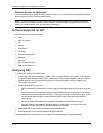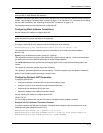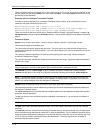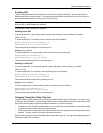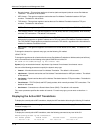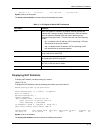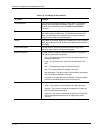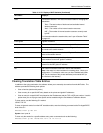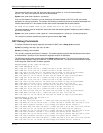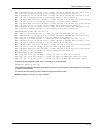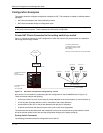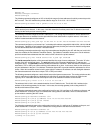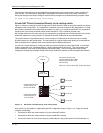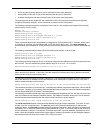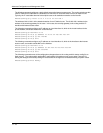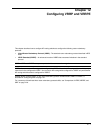
Advanced Configuration and Management Guide
This command clears the inside NAT entry that maps private address 10.10.10.5 to Internet address
209.157.1.43. Here is the syntax for this form of the command.
Syntax: clear ip nat inside <global-ip> <private-ip>
If you use Port Address Translation, you can selectively clear entries based on the TCP or UDP port number
assigned to an entry by the feature. For example, the following command clears one of the entries associated with
Internet address 209.157.1.44 but does not clear other entries associated with the same address.
HP 9304M or HP 9308M# clear ip nat inside 209.157.1.43 1081 10.10.10.5 80
The command above clears all inside NAT entries that match the specified global IP address, private IP address,
and TCP or UDP ports.
Syntax: clear ip nat <protocol> inside <global-ip> <internet-tcp/udp-port> <private-ip> <private-tcp/udp-port>
The <protocol> parameter specifies the protocol type and can be tcp or udp.
NAT Debug Commands
To configure the device to display diagnostic information for NAT, enter a debug ip nat command.
Syntax: [no] debug ip nat icmp | tcp | udp <ip-addr>
Syntax: [no] debug ip nat transdata
The <ip-addr> parameter specifies an IP address. The address applies to packets with the address as the source
or the destination. Specify 0.0.0.0 to enable the diagnostic mode for all addresses.
The following examples show sample output from debug ip nat commands. The first three examples show the
output from the diagnostic mode for ICMP NAT, TCP NAT, and UDP NAT. The fourth command shows the output
for the diagnostic mode for NAT translation requests.
HP9300# debug ip nat icmp 192.168.3.11
NAT: ICMP debugging is on
NAT: icmp src 10.10.100.18 => trans 192.168.2.78 dst 192.168.3.11
NAT: ICMP src 10.10.100.18 => trans 192.168.2.78 dst 192.168.3.11
NAT: 192.168.2.78 192.168.3.11 ID 60950 len 60 txfid 13 icmp (8/0/512/13824)
NAT: ICMP dest 192.168.2.78 => trans 192.168.3.11 dst 10.10.100.18
NAT: 192.168.3.11 10.10.100.18 ID 5571 len 60 txfid 15 icmp (0/0/512/13824)
NAT: icmp src 10.10.100.18 => trans 192.168.2.78 dst 192.168.3.11
NAT: ICMP src 10.10.100.18 => trans 192.168.2.78 dst 192.168.3.11
NAT: 192.168.2.78 192.168.3.11 ID 61206 len 60 txfid 13 icmp (8/0/512/14080)
NAT: ICMP dest 192.168.2.78 => trans 192.168.3.11 dst 10.10.100.18
NAT: 192.168.3.11 10.10.100.18 ID 5572 len 60 txfid 15 icmp (0/0/512/14080)
NAT: icmp src 10.10.100.18 => trans 192.168.2.78 dst 192.168.3.11
NAT: ICMP src 10.10.100.18 => trans 192.168.2.78 dst 192.168.3.11
NAT: 192.168.2.78 192.168.3.11 ID 61462 len 60 txfid 13 icmp (8/0/512/14336)
NAT: ICMP dest 192.168.2.78 => trans 192.168.3.11 dst 10.10.100.18
NAT: 192.168.3.11 10.10.100.18 ID 5573 len 60 txfid 15 icmp (0/0/512/14336)
HP9300# debug ip nat tcp 192.168.3.11
NAT: TCP debugging is on
NAT: tcp src 10.10.100.18:1144 => trans 192.168.2.78:8012 dst 192.168.3.11:53
NAT: tcp data src 10.10.100.18:1144 => trans 192.168.2.78:8012 dst 192.168.3.11:53
NAT: 192.168.2.78:8012 192.168.3.11:53 flags S ID 64534 len 44 txfid 13
NAT: tcp data dest 192.168.2.78:8012 => trans 192.168.3.11:53 dst 10.10.100.18:1144
NAT: 192.168.3.11:53 10.10.100.18:1144 flags S A ID 64921 len 44 txfid 15
NAT: tcp data src 10.10.100.18:1144 => trans 192.168.2.78:8012 dst 192.168.3.11:53
NAT: 192.168.2.78:8012 192.168.3.11:53 flags A ID 64790 len 40 txfid 13
NAT: tcp data src 10.10.100.18:1144 => trans 192.168.2.78:8012 dst 192.168.3.11:53
NAT: 192.168.2.78:8012 192.168.3.11:53 flags A ID 65046 len 78 txfid 13
NAT: tcp data dest 192.168.2.78:8012 => trans 192.168.3.11:53 dst 10.10.100.18:1144
NAT: 192.168.3.11:53 10.10.100.18:1144 flags A ID 64922 len 147 txfid 15
11 - 12



